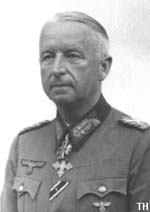Erich von Manstein

Tysk general.
- Sovjetunionen, 1941-44
- Krim, 1941-44
- Leningrad, 1941-44
- Kaukasus, 1942-43
- Stalingrad, 1942-43
- Ukraine, 1943-44
Manstein, Erich von (1887-1973): tysk generalfeltmarskal. Lagde planen for Vestfelttoget 1940; førte en armé på Østfronten, erobrede Krim. ledede tilbagetoget fra Stalingrad; dømt som krigsforbryder 1949, benådet 1953. Formentlig 2. verdenskrigs mest fremragende general. (LM18/1985)
Erich von Manstein, the son of an artillery officer, was born in Berlin, Germany on 24th November 1887. He was an Imperial court page before spending six years in the cadet corps. He joined the German Army and in 1906 was commissioned in the 3rd Footguards.
After the outbreak of the First World War Manstein served in Belgium before being wounded in Poland on November 1914. After recovering he returned to the Eastern Front before being sent to France in 1917.
Manstein remained in the army and in 1936 was appointed chief of operations. Promoted to the rank of major general he served under General Ludwig Beck as Oberquartermeiser. Considered to be uncooperative by Adolf Hitler he was sent to Silesia as commander of the 18th Division.
In the invasion of Poland Manstein served as chief of staff to the Army Group South under General Gerd von Rundstedt. In 1940 Manstein worked with Guenther Blumentritt and Henning von Tresckow to develop the plan to invade France. Manstein and his colleagues suggested that the German Army should attack through the wooded hills of the Ardennes. Hitler originally rejected the proposal but he eventually approved of a modified version of what became known as the Manstein Plan. Manstein was sent back to Silesia and did not take part in the successful operation until the final stages when he served under General Gunther von Kluge.
In February 1941, Manstein was appointed commander of the 56th Panzer Corps. He was involved in Operation Barbarossa where he served under General Erich Hoepner. Attacking on 22nd June 1941, Manstein advanced more than 100 miles in only two days and was able to seize the importance bridges at Dvinsk. The following month he captured Demyansk and Torzhok.
Manstein was appointed commander of 11th Army in September 1941, and was given the task of conquering the Crimea. The Red Army bravely defended Sevastopol and this important Black Sea naval base was taken until 2nd July 1942.
Promoted to field marshal Manstein was sent to capture Leningrad. This led to a series of bitter battles and over the next few months lost over 60,000 men.
In November 1942, Adolf Hitler ordered Manstein to rescue Fredrich von Paulus and the 6th Army at Stalingrad. He got his three panzer divisions to within 35 miles of the 6th Army but a Red Army counter-attack forced him to retreat to the Ukraine.
Manstein regrouped and the following year inflicted a heavy defeat on the Soviets at Krasnograd. An estimated 23,000 Soviet soldiers were killed and a further 9,000 were captured. Manstein now went on to capture Kharkov (14th March) and Belgorod (18th March). Adolf Hitler now overruled Manstein's desire to push the Soviet troops to the Sea of Azoz. Instead he was ordered to Kursk.
Manstein continued to argue with Hitler about overall strategy and in March 1944 he was dismissed from office. After the war Manstein was charged with war crimes. In court Manstein argued that he was unaware that genocide was taking place in territory under his control. However, evidence was produced that Manstein had ordered that "the Jewish Bolshevik system be wiped out once and for all" although he requested that officers should not be present during the killing of Jews.
Manstein was found guilty and he was sentenced on 24th February 1950 to 18 years imprisonment. However, for medical reasons he was freed on 6th May 1953. His war memoirs, Lost Victories, was published in Germany in 1955. Erich von Manstein died on 11th June 1973.